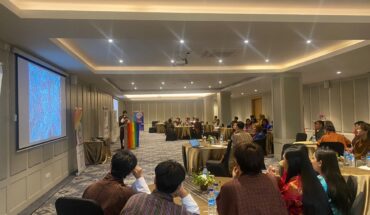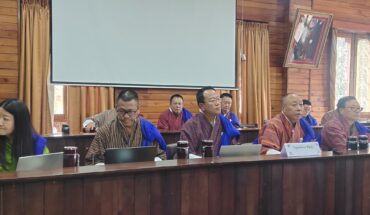
Bhutan Kidney Foundation Bridging the Gap Between Survival and Hope for CKD Patients through Shelter and Awareness
TIL BDR GHALLEY | Thimphu
As chronic kidney disease rises across Bhutan, the Bhutan Kidney Foundation (BKF) has become a lifeline for patients and families navigating the long road of dialysis and transplants.
Through shelters, food aid, awareness, and advocacy, BKF is not just saving lives—it’s restoring hope and dignity to those living on the line between survival and despair.
Since its inception in 2012, the BKF has become one of the country’s most vital community-based Civil Society Organizations (CSO) —bridging the gap between medical survival and social resilience for hundreds of chronic kidney disease (CKD) patients across Bhutan.
BKF records show 512 CKD patients registered, with more than 400 currently on dialysis and over 512 receiving ongoing support through the Foundation’s programs.
For many families, kidney disease brings emotional, social, and financial hardship that extends far beyond hospital walls.
More than 900 patients are presently benefiting from the foundation’s services.
We are trying to bridge the gap for rural patients who are economically and socially disadvantaged, and to give them timely dialysis,” said BKF Case Coordinator
Founder and Executive Director Tashi Namgay said the vision for BKF came from lived experience rather than theory.
“I went through the same path and I had faced daunting challenges. So, I thought of coming up with an organization to support the patients like me who are fighting chronic kidney diseases,” he said.
But establishing the Foundation was a long process.
“It took five and a half years to register as a CSO. Back then, we couldn’t provide financial support due to lack of funds,” he said.
Today, BKF operates as a structured national network with shelters, partnerships, and active public support.
“People know about BKF and trust it,” he said. “We now have proper governance, networks, and expanded services, including accommodation shelters in Bhutan and India.”
Even so, the number of patients continues to rise.
“In 1998, there were only two patients on dialysis. Now there are over 430 nationwide, and the number fluctuates because new cases emerge and some patients pass away,” the Executive Director added.
Initially, dialysis services were available only at national referral hospital in Thimphu. Patients from every dzongkhag travelled to the capital, often staying in compact guest house, temporary rental rooms or with distant relatives.
Housing shortages, high city expenses, and limited dialysis slots made treatment unpredictable, particularly for rural families.
Farmers, and low-income workers frequently spent months away from home, while caregivers took unpaid leave or resigned from jobs.
Some patients discontinued treatment because they could no longer afford to live in Thimphu. BKF staff said.
As the number of CKD cases increased, the government decentralized dialysis services to Mongar, Gelephu, Samtse, Wangdue Phodrang, Phuentsholing, and Paro.
This improved medical access; however, the social burden remained. Many patients still travel long distances, stay weeks at a time in treatment towns, and return home only briefly before the next dialysis cycle.
According to BKF, these hardships are among the leading reasons some patients decide to abandon treatment entirely.
Understanding that access to treatment means little without a roof to stay under, BKF began building patient shelters—safe spaces that offer more than accommodation.
To fill this critical gap, BKF established three dedicated patient shelters.
The Wangdue Phodrang Shelter, opened on 15 August 2023, supports five patients and provides basic facilities including WiFi, television, furniture, and bedding.
The Gelephu Shelter, opened on 14 April 2024, houses ten permanent and eighteen temporary patients and has served fourteen patients from Mongar.
The Kolkata Kidney Guest House, established on 4 June 2025, has space for thirty patients and currently shelters twelve.
It provides full amenities and is managed by in-house staff to assist Bhutanese patients referred to India for transplant and post-surgery follow-up.
CKD impacts entire families, who face emotional trauma and financial hardship. Caregivers often must resign from jobs to provide care.
Behind every number is a story of hardship. Many patients lose their livelihoods after starting dialysis.
Caregivers, often spouses or children, leave work to provide full-time care.
Kidney disease often forces patients to stop working, leading to income loss for entire families.
Some civil servants and private workers resign to care for their spouses. Without BKF shelters, many would have nowhere to live during treatment.
A BKF official noted that kidney disease creates a difficult chain reaction.
“Once patients begin dialysis, they often struggle to remain productive citizens. Unlike in developed countries, very few people in Bhutan are able to continue working while on dialysis,” the official said.
Yet, the tone turned hopeful as the official added, “Once they undergo a transplant, everything changes. They regain their strength, return to work, and become active contributors to their communities once again.”
Beyond direct supports, BKF also addresses indirect or secondary social challenges such as school dropouts caused by parental illness, intervening to keep vulnerable children in education.
During a recent assessment in Mongar, the Foundation found around 20 students at risk of leaving school. BKF intervened to ensure they remained in class.
“There is a huge gap between the have and the have-not,” a BKF representative said. “Parents have kidney problems and children were dropping out. To give the child a better chance, BKF is providing support.”
The Foundation’s holistic approach helps patients navigate social emergencies, including rescue efforts for destitute patients abandoned by families.
One such case was that of Karma, a woman who had returned home after years of working abroad. What was meant to be a hopeful homecoming quickly turned into despair when she was diagnosed with kidney failure.
At first, her family stood by her side, but as her savings dwindled and the medical expenses mounted, their support faded. Eventually, she was left alone—abandoned when she needed love and care the most.
“She called us, and we rescued her,” a BKF official said. “This is just one example. We have rescued many clients. We have many heart-wrenching stories.”
For many like Karma, the BKF support becomes far more than a roof over their heads.
To them, it is a sanctuary—a lhakhang, a temple of compassion where they find kindness, dignity, and the strength to begin again.
In addition to providing social support, the BKF has made significant investments in awareness and prevention initiatives.
Through the Japanese Embassy Programme (JEP), the Foundation received a dedicated outreach bus and conducted nationwide kidney health awareness campaigns from July 2020 to August 2024, reaching every nook and corner of Bhutan.
BKF also leverages social media platforms such as Facebook, WhatsApp, and Telegram, along with partnerships with hospitals, to disseminate information and conduct health screenings.
Not only does the BKF extend social support, but it also provides crucial financial assistance to kidney patients who seek treatment outside the country, particularly in places like Vellore.
Although the government facilitates referrals for such cases, some patients are reluctant to travel due to high out-of-pocket expenses.
To bridge this gap, BKF offers financial support based on individual needs and thorough assessments conducted by the foundation.
During the assessment, patients are categorized from A to E, depending on their financial condition and medical situation. Those placed in category A receive Nu. 22,500 per month, with a 15 percent difference between each subsequent category.
“This system ensures that support is fair and based on genuine need,” a BKF official said.
But mis- information and late diagnosis remain challenges.
Janu Maya, a 29-year-old resident of Sipsu, Pemaling, Samtse, said, “In the villages, many still do not know the early symptoms of kidney disease. When they finally visit the hospital, the disease is already advanced.”
Recently, BKF conducted awareness programmes in Bumthang and Jakar Higher Secondary School, focusing on hydration, diet, hypertension, and early testing.
However, Tashi Namgay said awareness alone is not enough.
“We have learned that we need evidence-based behavior change projects. In areas with high hypertension or obesity, we plan pilot projects with cooking demonstrations on how much salt to use, encouraging local produce, and promoting physical activity,” he said.
BKF also continues to work with the Ministry of Health to address social challenges hospitals cannot cover.
“We identify social issues faced by patients and advocate with the government for solutions. The ministry has been very supportive,” he said.
The Foundation has also advocated for the introduction of peritoneal dialysis, a home-based treatment option that allows patients to stay with their families and limits long travel to hospitals.
As part of its effort to bring services closer to patients, the BKF plans to open a new shelter in Samtse.
A recent assessment by the foundation revealed a pressing need for accommodation and support facilities in the area.
The foundation believes that expanding shelters will reduce pressure on existing centers and provide safer spaces for vulnerable patients.
The national referral hospital, in collaboration with BKF, recently organized a special consultation programme for kidney transplant recipients.
For more than a decade, the BKF has served as a social lifeline for kidney patients—providing transportation, shelters, food assistance, counseling, school support, and rescue services. Dialysis keeps patients alive, but without social support, many cannot survive the emotional and financial hardships that come with lifelong treatment.
While the government expands medical treatment and transplant opportunities, BKF continues to ensure that no patient is left behind because of poverty, distance, or family crisis.
From Wangdue Phodrang to Gelephu and all the way to Kolkata, BKF shelters are providing more than a roof.
They offer safety, dignity, food, stability and hope. For kidney patients who once slept in guest house or borrowed relatives’ floors, these shelters are proof that support does not end at the hospital door.
In a healthcare system where treatment is free but living is costly, BKF has stepped in to ensure that every life has a fair chance to heal.
(This article is supported by Bhutan Media Foundation and Helvetas Bhutan, with funding from the European Union)





